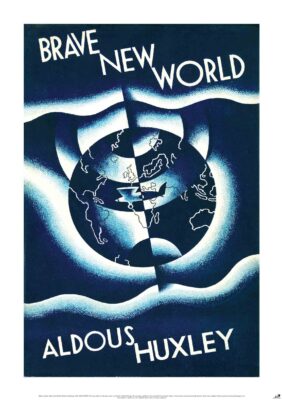
22 November 2021
Aldous Huxley 1894-1963 and his infamous glimpse into the future through his book, Brave New World.
I am of course very happy I remain on the Earth…
A squat grey building of only thirty-four stories. Over the main en- trance the words, Central London Hatchery and Conditioning Centre, and, in a shield, the World State’s motto, Community Iden-tity, Stability.
Summary: Chapter 2 Brave New World
The Director leads the group of students to the Nurseries. Posted on a notice board are the phrases, “Infant Nurseries. Neo-Pavlovian Conditioning Rooms.” The students observe a Bokanovsky group of eight-month-old babies wearing the Delta caste’s khaki-colored clothes. Some nurses present the babies with books and flowers. As the babies crawl toward the books and the flowers, cooing with pleasure, alarms ring shrilly. Then, the babies suffer a mild electric shock. Afterward, when the nurses offer the flowers and books to the babies, they shrink away and wail with terror.
The Director explains that after 200 repetitions of the same process, the children will have an instinctive hatred of books and flowers. A hatred for books is ingrained in the lower castes to prevent them from wasting the community’s time reading books that might “decondition” them. The motivation for instilling a hatred for flowers is more complicated. The Director explains that Gammas, Deltas, and Epsilons were once conditioned to like flowers and nature in general. The idea was to compel them to visit the country often and “consume transport” in the process. But since nature is free, they consumed nothing other than transportation.
Full text: A Connecticut Yankee in King Arthur’s Court
In order to increase the consumption of goods, The World State decided to abolish the love of nature while preserving the desire to use transportation. The lower castes are now conditioned to hate the countryside but to love country sports. All country sports in the World State require the use of elaborate apparatus. As a result, the lower castes now pay for both transportation and manufactured goods when they travel to the country for sporting events.
The Director begins to tell a story about a child named Reuben who has Polish-speaking parents. The students blush at the mere mention of the word parent. References to sexual reproduction, including words like mother and father, are now considered pornographic. In the World State, people only use such words in clinical discussions.
The Director continues with his story. One night, Reuben’s parents left the radio on while he slept. The child woke up reciting a broadcast of a George Bernard Shaw speech verbatim. The parents did not understand English, so they thought something was wrong. Their doctor understood English and notified the medical press of the event. Reuben’s overnight learning led to the discovery of sleep teaching, or hypnopaedia. The Director informs the students that the discovery of hypnopaedia came only twenty-three years after the first Ford Model T was sold. He makes the sign of the T on his stomach (as an observant Catholic might make the sign of the cross) and the students follow suit. He explains that researchers of hypnopaedia soon discovered that it was useless for intellectual training. Reuben could repeat the speech word for word, but had no idea what it meant. The place where hypnopaedia can be used, however, is moral training.
The Director leads the tour to a dormitory where some Beta children are sleeping. The Nurse informs them that the Elementary Sex lesson is over and the Elementary Class Consciousness lesson has just begun. A recorded voice whispers to each sleeping child. It states that Alpha children have to work harder than the other classes and it disparages the lower intelligence and inferiority of the lower castes. The voice teaches pride and happiness in the Beta caste: Betas do not have to work as hard as the cleverer Alphas, it explains, but they are still smarter than the Gammas, Deltas, and Epsilons. The Director explains that the lesson will be repeated one hundred and twenty times, three times a week, for thirty months. Hypnopaedia instills the fine distinctions and prejudices for which electric shocks and alarms are too crude. Hypnopaedia, the Director concludes, is “the greatest moralising and socialising force of all time.”
Analysis: Chapter 2
The first half of the students’ tour, described in the previous section, illustrates the World State’s abuse of biological science in conditioning its citizens. This section focuses on the use of psychological technologies to control the future behaviour of World State citizens. Conditioning, combined with prenatal treatment, creates individuals without individuality: each one is programmed to behave exactly like the next. This system allows for social stability, economic productivity within narrow constraints, and a society dominated by unthinking obedience and infantile behaviour.
The conditioning technique used to instil a dislike for flowers and books in infants is modeled after the research of Ivan Pavlov, a Russian scientist. Pavlov demonstrated that dogs could be trained to salivate at the ringing of a bell if the sound was consistently visually associated with food. This led to the observation that other kinds of responses could also be conditioned. His work became known to Western science in the decade before Brave New World was written. By applying Pavlovian theory to human infants, the state literally programs human beings to uphold the status quo.
The conditioning also drives the population to support the capitalist economic system. Because the World State wants children to be loyal consumers as adults, the importance of the individual is diminished in order to further the interests of the larger community. Even during their off-work hours, World State citizens serve the interests of production and, therefore, the interests of the whole economy and society, by consuming transportation and expensive sporting equipment. Any opportunity for individual, idiosyncratic behaviour that might not feed the economy is eliminated.
Brave_New_World_Aldous_Huxley
Further Study
Books of Interest